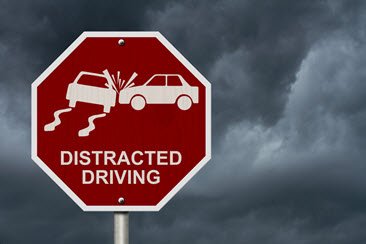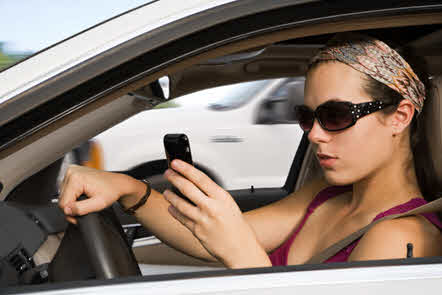Driving While Under the Influence of Distractions
"There's an increasing public safety issue of operators of vehicles who are distracted while driving."
"It's analogous [to a bar owner or party host taking responsibility for an intoxicated client/guest] --you're putting someone in a position [dialing someone on their cellphone if you know they're driving] where they could cause harm to themselves or [to] a third party."
"I think it's a [consequence] unfortunately of living in a highly connected world where, if someone doesn't respond immediately to an email or a text, your concern is they are ignoring you."
Jordan Solway, lawyer, vice-president, claims, Travelers Canada
1. Losing focus or being lost in thought
2. Cell phone use - talking, texting, dialing
3. Objects, events or people outside the vehicle
4. Passengers
5. Reaching for things – such as a GPS
6. Eating or drinking
7. Adjusting the radio or climate controls
8. Using vehicle controls – adjusting mirrors, seats, using navigation system
9. Moving objects - pets
10. Smoking-related distractions
"The aspect of determining liability or fault in cases like that would rest with the courts."
"It has to be a whole host of instances in terms of not just the act of texting, but also the act of reading the text or responding or having that phone in your hand."
"It's a concern that we share as an industry because that will impact [insurance] premiums."
Pete Karageorgos, spokesperson, Insurance Bureau of Canada
Five seconds is the average time your
eyes are off the road while texting. At 55 mph, that's enough time to
cover the length of a football field.
McClatchy
|
Accidents will and do occur. And now a new element is being recognized, one that points a finger of responsibility at anyone knowingly dialing a cellphone in the knowledge that its owner/user will be in their vehicle and driving to a destination. Peoples' impulses are to immediately respond; it has become second-nature to the current generations of cellphone users to 'pick-up' as though each and every call has an urgent component to it.
Leading insurance and legal experts to express their concern over liability when harm ensues. Texters, they point out, could in future be held liable should they message a person whom they know is driving and in the course of events that follow, an accident occurs. A 2013 New Jersey court ruled that a text sender causing a driver to become distracted and have an accident, may be held liable for their part in the incident; the initiator of it, in fact.
In the case that stirred the court to action, an 18-year-old was driving a vehicle when his girlfriend texted him some 25 seconds before his pickup truck crossed a median. A motorcyclist and his wife came out of the ensuing collision seriously injured; both lost their left legs in the 2009 accident. Losing eye contact with the road ahead, pausing however briefly to focus on a text message instead has the potential to swiftly invite catastrophe.

According to Jordan Solway, an insurance legal expert, it's just a matter of time before such incidents occur more frequently, though Canada has not yet experienced a similar accident. A recent online survey to study the matter of distracted drivers focusing on texts was commissioned by Travelers Canada. Thirty-one percent of those questioned responded that family obligations require their constant attention.
Divided by gender, 40 percent of women reasoned concern over family matters led them to immediately respond to their cellphones when driving, while for males the same concerns reflected the responses of 23 percent of those questioned. There were even provincial differences, where in Quebec 23 percent cited family obligations whereas in Ontario the figure rose to 41 percent.
But there were other reasons as well, with 27 percent stating they had no wish to miss important issues that might be conveyed via a cellphone message, while another 14 percent explained it is their wish to always be available for professional purposes. Finally, 8 percent claimed they were fearful of upsetting their employer should they decide not to answer while driving.
According to the Insurance Bureau of Canada's Karageorgos, some insurers are coming across more frequent instances of rear-end collisions, typical of drivers being distracted by their cellphones and briefly losing awareness of their driving responsibilities.
 |
Labels: Distracted Driving, Insurance, Vehicle Accident

0 Comments:
Post a Comment
<< Home